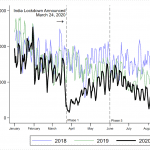Three Reasons Impact Investors Aren’t Sweating Trump’s Climate Policies: An Interview with Nancy Pfund
The Trump administration’s climate agenda is coming into alarming focus – this week, the president signed what’s been called a “sweeping demolition of Obama-era policies on coal mining, fracking, greenhouse gas emissions and climate change.” Nancy Pfund’s impact investing firm, DBL Partners, is heavily invested in environment-focused enterprises. So with all the uncertainty, why is she still smiling?
“No question, we’re in unprecedented and unpredictable territory with our new administration,” Pfund said in an interview recorded at The Economist’s “Impact Investing: Mainstreaming Purpose-Driven Finance” event last month. “However – and I’m not alone in saying this – what happens in Washington is not going to stop this trend toward innovation and sustainability. And that’s because the costs are in our favor.”
The global cost of solar, wind and batteries is on a dramatic downward trajectory, she said, which has transformed them from an expensive, alternative solution to a “mainstream, cost-competitive approach to developing your grid.” And as the market has taken the reins from the government, the fate of sustainable energy solutions has moved largely beyond Trump’s reach. “This really doesn’t have to do with politics. It has to do with what’s cheap, what’s high-performing, and what fits into the grid of the future.”
But even on the government front, there is reason for optimism: “States play a huge role in the way that new energy technologies are innovated and released and regulated,” Pfund pointed out. “There’s a lot more action at the level of regions and state governments than at the federal government. … In most state houses across the country, this is a bipartisan issue. Some of the highest penetration wind states are the reddest states of our nation – it’s not just a coastal phenomenon. And also, clean energy polls very well across the political spectrum. The fact that jobs are being created in red, blue, purple states, whatever – that speaks volumes. … It’s not just a path to sustainable energy, it’s a path to quality job creation.”
She also pointed out another reason to be bullish on the future of environment-focused impact investing: “The international opportunity to create electricity for the over 1 billion people that don’t have it today – that’s unaffected by what’s going on in Washington, so that’s a huge area of investment over the next five to 10 years. Even if there are certain environmental laws or regulations that are dismantled or changed over the next few years at the federal level, that won’t stop the innovation cycle from chugging along. Once you’ve boarded that train, it’s really hard to get off of it when it’s bringing you cheaper, cleaner, more reliable and more accessible energy products.”
Pfund touched on other topics in our interview, including some innovative DBL investees focused on off-grid energy and agriculture in emerging markets. She also discussed her firm’s success in working with “entrepreneurs that are really building the replacements to 20th century leaders,” including companies like Tesla and Solar City, and shared her thoughts on the eternal question of whether it’s possible to maximize both financial returns and social impact. You can view the conversation in the video below.
James Militzer is NextBillion’s senior editor.
Homepage photo credit: RTPeat, via Flickr.
- Categories
- Energy, Environment, Investing, Technology



